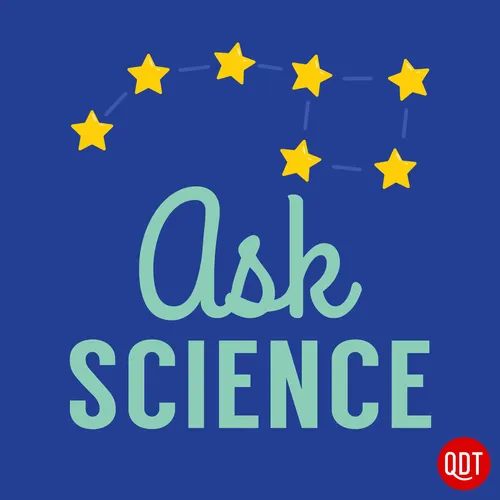
Ask Science
How do astronomers photograph a black hole? How often do planes get hit by lightning? What does the EPA actually do? Science is all around us and transforming our world at a rapid pace. Extragalactic astrophysicist Sabrina Stierwalt is here to guide you through it. She'll help you make sense of the everyday and the once-in-a-lifetime. Rights of Albert Einstein are used with permission of The Hebrew University of Jerusalem. Represented exclusively by Greenlight.
- Update frequency
- every 6 days
- Average duration
- 7 minutes
- Episodes
- 414
- Years Active
- 2012 - 2022

388 - Astronomers Found a Sign of Life on Venus—What Does It Mean?
Astronomers recently made a huge discovery—there may be life on Venus. But what does it really mean when we say we've discovered the potential for life on the second rock from the Sun? Don't go searc…

387 - How Do We Control Wildfires? The Surprising Facts
How many days can it take to control a large wildfire? (More than you think.) Who fights wildfires? (You may be surprised!) What tools and methods do firefighters use to control, extinguish, and prev…

386 - What Is a Derecho? A Meteorologist Explains
Hurricanes and strong tornadoes make headlines, but fewer people know about the unique and destructive weather force known as a derecho. What are derechos, and why are they so devastating? Everyday E…

385 - Why Do We Need to Save the Bees?
Wild bee populations are at risk. Why are wild bee colonies in decline, why is it a big deal, and how can you help? First, step away from the pesticides.

384 - Did Scientists Just Unravel One Mystery of Stonehenge?
Recently, a rock sample from the Neolithic structure Stonehenge made its way to a science lab after 60 years in a private collection. Here's what we learned from it.

383 - What Does Your Blood Type Mean? How Rare Is Yours?
Your blood type is one of the many things you inherit from your parents. But what does it mean, and how does it affect your medical care? Do you have a rare blood type?

382 - Emotional, Irritated, Faking It—Why Do Humans Cry?
Humans seem to be the only animals who produce one of three different types of tears. Can you guess what it is? Let's look at the science behind crying.

381 - Wearing a Mask During Coronavirus—Separating Myths from Facts
We have scientific evidence that masks effectively and dramatically reduce the spread of COVID-19, yet myths about mask-wearing abound. Let's put them to rest and mask up!

380 - Can Nukes Actually Stop a Devastating Hurricane?
Congress recently introduced a bill to prohibit the President from using weapons to alter weather patterns. But can you tame a hurricane by nuking it off the map?

379 - Is It Aliens? A Science Writer On UFOs and Her Visit to Area 51
Are aliens out there observing us? If they're not, why has the Pentagon released videos of "unidentified aerial phenomena?" What's going on at Area 51, anyhow?

243 - 8 Rules for Picking the Right Sunscreen According to Science
Does the SPF really matter? Should I go organic? What about the warnings on possible carcinogens in sunscreens? Is it better to avoid sunscreen altogether? Let's ask science!

378 - Without Plate Tectonics, Earth Might Not Support Life
The Earth's surface is made of large slabs called plates. They move faster than your fingernails grow, and life on Earth might not exist without them.

377 - Did a Virus Make Us Mammals?
Many viruses are like bad party guests—they show up uninvited and wreak havoc. But some viruses are more cooperative guests. A virus may have even made us mammals!

376 - Has NASA Found a Parallel Universe?
Did NASA really discover a parallel universe where time runs backward? It's not impossible! But we're still a long way from proving it.

375 - "Is Takeout Safe?" and Other Food Safety Questions
How concerned should you be about transmission of the novel coronavirus through food?

374 - Subterranean Rivers—Water Flowing Underground
There's much left unexplored beneath Earth's surface, uncluding miles of underground rivers. What forms them? What lives there? And how do these subterranean waterways help science?

373 - Why Is a NASA Spacecraft Currently Orbiting an Asteroid?
The OSIRIS REx spacecraft will perform a cosmic smash-and-grab on the surface of the potentially hazardous asteroid, Bennu. What do scientists hope to learn?

372 - Can I visit just one other family while social distancing?
You're longing for connection, your child is begging for a playdate, you're stir crazy. Is it okay to visit with just one other family during the COVID-19 pandemic?

371 - What Is the Air Quality Like Near You?
Is the air noticeably clearer where you live right now? For Earth Day, you can become a citizen scientist by using an app to track air pollution in your neighborhood.

370 - What's the Difference Between Germs, Bacteria, and Viruses?
What’s the difference between a germ, a virus, and bacteria? Let's put these different disease-causing objects under a microscope and find out.